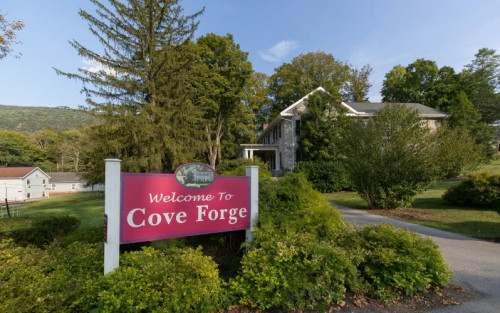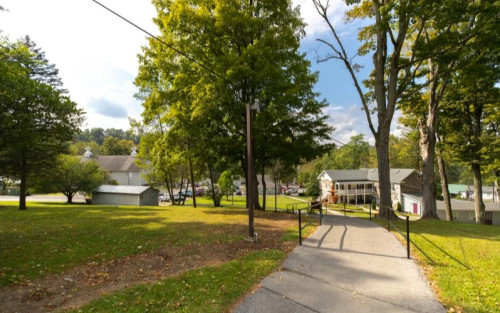






Cove Forge Behavioral Health
Treatment Focus
This center treats substance use disorders and co-occurring mental health conditions. Your treatment plan addresses each condition at once with personalized, compassionate care for comprehensive healing.
Primary Level of Care
Offering intensive care with 24/7 monitoring, residential treatment is typically 30 days and can cover multiple levels of care. Length can range from 14 to 90 days typically.
Claimed
Recovery.com has connected directly with this treatment provider to validate the information in their profile.
Treatment Focus
This center treats substance use disorders and co-occurring mental health conditions. Your treatment plan addresses each condition at once with personalized, compassionate care for comprehensive healing.
Primary Level of Care
Offering intensive care with 24/7 monitoring, residential treatment is typically 30 days and can cover multiple levels of care. Length can range from 14 to 90 days typically.
Provider's Policy
Please call our admissions team for more information on insurance coverage. A knowledgeable member of our team can answer any financial questions and contact your insurance carrier to verify and maximize your benefits. This service is free and puts you under no obligation to choose our programming.
Cove Forge Behavioral Health
Cove Forge Behavioral Health
About Cove Forge Behavioral Health
Located among the woods and mountains of the beautiful Pennsylvania countryside, Cove Forge Behavioral Health System provides comprehensive care for individuals who are battling substance abuse, chemical dependency, and other chronic behavioral health disorders. Cove Forge offers a full continuum of evidence-based treatment, ranging from detox to outpatient care.
The treatment and rehab programs offered at Cove Forge fall under two basic types of programming: regular rehabilitation and dual diagnosis rehabilitation. When individuals are working to overcome a substance use disorder while also battling the symptoms of a co-occurring mental health disorder, they can benefit from participating in a dual diagnosis program. This program is designed to be diagnosis-specific, offering individuals the opportunity to receive truly personalized care that is centered on their unique treatment requirements. While in this rehab program, individuals are able to work with both a chemical dependency counselor and a mental health counselor, ensuring that professional intervention is received at all levels.
Detox
Designed to help individuals safely withdraw from physically addicting drugs, such as alcohol, opioids, and sedative-hypnotics, the detox program at Cove Forge is monitored by medical staff and includes 24-hour nursing supervision. The typical length of stay is between 3 and 5 days, at which point patients progress to the Residential program.
Residential Program
Cove Forge’s residential rehabilitation program is a co-ed treatment option for adults with a primary diagnosis of chemical dependency. Residents typically stay 2–4 weeks, but actual length of stay is determined according to each individual’s needs. The residential treatment program consists of individual 30-minute therapy sessions at least once per week, group therapy, family therapy, and 12-step facilitation. Experiential therapies are also included in the program, such as music therapy, recreation therapy, and art therapy. Cove Forge also hosts many groups, including chemical dependency groups, diagnosis-specific mental health groups (such as anxiety and depression), gratitude groups, Bible study, music performance group, and “real talk” groups, with topics covering life skills like relapse prevention, stress management, and post-acute withdrawal syndrome (PAWS).
Partial Hospitalization Program (PHP)
Most individuals enter PHP as a step-down level of care following residential treatment, with eventual transition to an outpatient treatment program in their home area. Cove Forge’s program includes a housing component, with separate residences for men and women. Programming occurs 7 days per week.
Veterans Program
Cove Forge understands how complex addictions and mental health disorders are for those who have served in the military. The Veterans Program provides personalized support for veterans who are struggling with addictions and co-occurring mental health disorders. Veterans who are going through withdrawal must complete medical detoxification prior to entering the program. Program therapies include individual, group, and family therapy, as well as reality therapy, cognitive behavioral therapy (CBT), motivational interviewing, and the 12-Step recovery model, The Veterans Program also offers experiential therapies, including a ropes course and rock climbing twice a week. The average length of stay in the program is 21-28 days.
H.O.P.E. (Heroin Opiate Positive Experience) Program
Cove Forge believes that chemical dependence is a disease, not a character flaw, and should be treated as such. Throughout the recovery community, and society at large, there is a vast amount of misinformation about addiction and relapse. Cove Forge addresses the disease of addiction on a deeper, neurobiological level, focusing on activities and supports that promote healing. Using researched-backed treatment modalities, the HOPE program at Cove Forge offers groups and activities including a humor group, exercise program, endorphin-inducing nutrition, and a Big Brother/Big Sister (mentorship) program. Clients meet with nurses for individual support and education sessions, and VIVITROL/ReVia is offered as a recovery support option for opioid dependence.
River of Life Christian Program
The opportunity to practice one’s faith can be critical to the healing process from addiction and co-occurring mental health challenges. Cove Forge understands that integrating teachings of the Bible, such as love, forgiveness, suffering, perseverance, and hope, may help some individuals find the inner strength they need to reach their recovery goals. Whether a patient has deep faith-based roots or is interested in exploring faith as part of the healing process, patients have the option of adding this specialty track while participating in either the residential or partial hospitalization program. Patients can choose to attend Christ-centered groups Mondays through Fridays, as well as church services on Sunday afternoons. A pastoral counselor leads the faith-based groups at Cove Forge Behavioral Health, incorporating both therapeutic and theological concepts into each group discussion.

Center Overview
Treatment Focus
This center treats substance use disorders and co-occurring mental health conditions. Your treatment plan addresses each condition at once with personalized, compassionate care for comprehensive healing.
CARF Accredited
CARF stands for the Commission on Accreditation of Rehabilitation Facilities. It's an independent, non-profit organization that provides accreditation services for a variety of healthcare services. To be accredited means that the program meets their standards for quality, effectiveness, and person-centered care.
Insurance Accepted
Cash Pay Rates
Estimated Cash Pay Rate
Center pricing can vary based on program and length of stay. Contact the center for more information. Recovery.com strives for price transparency so you can make an informed decision.
Levels of Care








Your Care Options
Specializations
Veterans
Patients who completed active military duty receive specialized treatment focused on trauma, grief, loss, and finding a new work-life balance.
Drug Addiction
Drug addiction is the excessive and repetitive use of substances, despite harmful consequences to a person's life, health, and relationships.
Heroin
Heroin is a highly addictive and illegal opioid. It can cause insomnia, collapsed veins, heart issues, and additional mental health issues.
Christian
Through surrender and commitment to Christ, patients refocus the efforts and source of their recovery with clinical and spiritual care.
Alcohol
Using alcohol as a coping mechanism, or drinking excessively throughout the week, signals an alcohol use disorder.
Who We Treat
Veterans
Patients who completed active military duty receive specialized treatment focused on trauma, grief, loss, and finding a new work-life balance.
Men and Women
Men and women attend treatment for addiction in a co-ed setting, going to therapy groups together to share experiences, struggles, and successes.
Approaches
Twelve Step
Incorporating spirituality, community, and responsibility, 12-Step philosophies prioritize the guidance of a Higher Power and a continuation of 12-Step practices.
Experiential
Expressive tools and therapies help patients process past situations, learn more about themselves, and find healing through action.
Spiritual Emphasis
Spirituality connects patients to a higher power and helps strengthen their recovery, hope, and compliance with other treatment modalities.
Christian
Through surrender and commitment to Christ, patients refocus the efforts and source of their recovery with clinical and spiritual care.
Evidence-Based
A combination of scientifically rooted therapies and treatments make up evidence-based care, defined by their measured and proven results.
Individual Treatment
Individual care meets the needs of each patient, using personalized treatment to provide them the most relevant care and greatest chance of success.
Therapies
Spiritual Care
Tending to spiritual health helps treatment become more effective, allowing patients to better cope with their emotions and rebuild their spiritual wellbeing.
Family Therapy
Family therapy addresses group dynamics within a family system, with a focus on improving communication and interrupting unhealthy relationship patterns.
Twelve Step Facilitation
12-Step groups offer a framework for addiction recovery. Members commit to a higher power, recognize their issues, and support each other in the healing process.
Psychoeducation
This method combines treatment with education, teaching patients about different paths toward recovery. This empowers them to make more effective decisions.
Art Therapy
Visual art invites patients to examine the emotions within their work, focusing on the process of creativity and its gentle therapeutic power.
Life Skills
Teaching life skills like cooking, cleaning, clear communication, and even basic math provides a strong foundation for continued recovery.
Rational Emotive Behavior Therapy
A type of cognitive therapy that identifies negative self-defeating thoughts and behaviors, rewriting beliefs to be positive, empowering, and present.
Substances We Treat
Prescription Drugs
It's possible to abuse any drug, even prescribed ones. If you crave a medication, or regularly take it more than directed, you may have an addiction.
Ecstasy
Ecstasy is a stimulant that causes intense euphoria and heightened awareness. Abuse of this drug can trigger depression, insomnia, and memory problems.
Co-Occurring Disorders
A person with multiple mental health diagnoses, such as addiction and depression, has co-occurring disorders also called dual diagnosis.
Psychedelics
Hallucinogenic drugs—like LSD—cause euphoria and increased sensory experiences. When abused, they can lead to depression and psychosis.
Drug Addiction
Drug addiction is the excessive and repetitive use of substances, despite harmful consequences to a person's life, health, and relationships.
Heroin
Heroin is a highly addictive and illegal opioid. It can cause insomnia, collapsed veins, heart issues, and additional mental health issues.
Synthetic Drugs
Synthetic drugs are made in a lab, unlike plant-based drugs like mushrooms. Most synthetic drugs are either stimulants or synthetic cannabinoids.
Methamphetamine
Methamphetamine, or meth, increases energy, agitation, and paranoia. Long-term use can result in severe physical and mental health issues.
Languages
Care Designed for Your Needs
Special Considerations
Religion-Based Track
Patients can join faith-based recovery tracks to approach recovery with others in their faith, healing in a like-minded group with similar goals.





